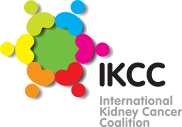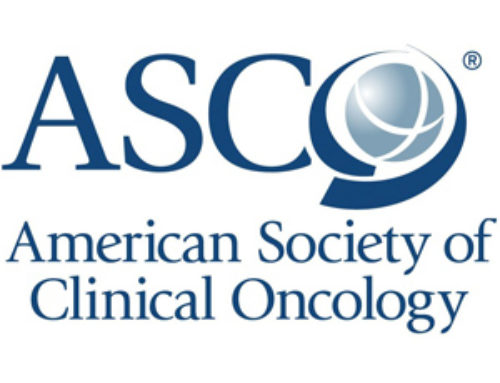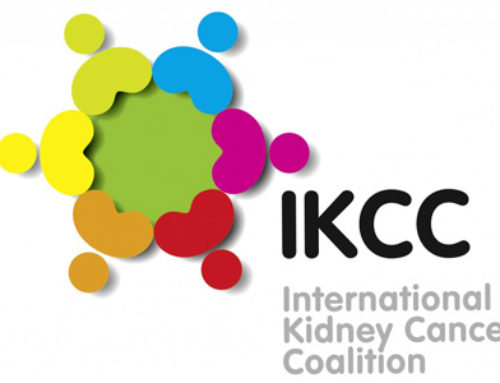This year’s European Society for Medical Oncology (ESMO) Congress was held from 13-17 September 2024, in Barcelona, Spain. The presentations are available to read on the ESMO website. Some affiliates of the International Kidney Cancer Coalition (IKCC) went to the meeting to keep up to date with the care and treatment of patients with kidney cancer. In this report, a brief “Take home messages” section is followed by more in-depth review of selected abstracts.
Please note: The following summary was prepared for the benefit of patient advocates and patient organisations around the world who focus on kidney cancer. While this summary has been medically reviewed, the information contained herein is based upon public data shared at this meeting and is not intended to be exhaustive or act as medical advice. Patients should speak to their doctor about their own care and treatment.
Take home messages
In abstract LBA74, the results from the LITESPARK-005 study showed that for patients with advanced kidney cancer who had already been treated with immunotherapy or targeted therapy, belzutifan increased the time to when the cancer started growing again compared to everolimus. Also, more patients responded to treatment with belzutifan compared to everolimus. Belzutifan was relatively well tolerated, and no new side effects were reported.
In abstract LBA73, the TiNivo study showed that treatment with a second line of immunotherapy did not improve patient outcomes and should be discouraged in patients with advanced kidney cancer. Furthermore, the findings suggest that tivozanib alone is effective for patients whose cancer progresses on immunotherapy.
In abstract 1690O, NKT2152 was shown to be effective in heavily pretreated, high-risk patients with advanced kidney cancer. The side effect profile was as expected for a HIF-2α inhibitor. Two dose regimens have been selected and are being looked at in the second part of this study.
In abstract LBA76, the combination of new anti-cancer medications benmelstobart + anlotinib (an immunotherapy plus a targeted therapy) improved survival and response to treatment compared with sunitinib in patients with previously untreated advanced kidney cancer. The combination had manageable side effects. These results support the use of benmelstobart + anlotinib as a new first-line treatment for advanced kidney cancer.
In abstract LBA77, early results from the TACITO study show the role of faecal microbiota transplantation in increasing the effectiveness of immunotherapy-based treatments for metastatic kidney cancer patients for the first time.
In abstract LBA75, the SUNNIFORECAST study shows a survival benefit for patients with non-clear cell kidney cancer treated with the ipilimumab + nivolumab combination compared to standard of care. This is the first randomised trial that compares an immunotherapy combination with standard of care in patients with non-clear cell kidney cancer.
Summaries
Promising post-immunotherapy treatments for advanced kidney cancer
Treatments for people with advanced kidney cancer have developed over the past decade and there have been big improvements in patient outcomes and survival. However, unfortunately for most patients their cancer eventually gets worse over time despite treatment. Researchers continue to look for new treatments and different combinations of treatments to extend survival after first-line treatment stops working.
In many countries, combinations of vascular endothelial growth factor receptor tyrosine kinase inhibitor (VEGFR TKI) anti-cancer mediations plus immunotherapies are the standard of care as the first anti-cancer treatments for patients with advanced/metastatic kidney cancer. This is because there is better response to treatment, longer progression-free survival and longer overall survival times compared to VEGFR TKI alone. However, the best sequence of treatments after the cancer has progressed is unknown.
Abstract LBA74: Belzutifan compared to everolimus in patients with previously treated advanced clear cell kidney cancer (the LITESPARK-005 study)
Studies looking at the genes in kidney cancer tumours have shown changes in a gene called von Hippel-Lindau (VHL). Changes (mutations) in the VHL gene leading to loss of VHL function results in high levels of a protein called hypoxia-inducible factor, or HIF-2α in the affected cells. This causes changes in the cells that cause tumour formation and growth. A new medicine called belzutifan is a tablet that blocks the action of HIF-2α and, therefore, blocks cancer cell growth.
A small number of people inherit an abnormal VHL gene, which is then found throughout their bodies, thereby causing VHL disease. These individuals develop tumours in the kidney, brain, spinal cord, and pancreas. Belzutifan has been approved in some countries for the treatment of people with VHL disease.
Belzutifan has also been shown to be effective for the treatment of advanced kidney cancer, where the mutated VHL gene is only found in the tumour itself. Updated results from the phase 3 LITESPARK-005 study of belzutifan compared to everolimus for heavily pre-treated advanced kidney cancer patients were presented at ESMO 2024.
There were 746 patients with advanced kidney cancer in the LITESPARK-005 study. They were randomised to be treated with either belzutifan or everolimus, an mTOR inhibitor tablet. Patients had already been treated with between 1-3 courses of immunotherapy or VEGFR TKI. Patients were followed-up for an average of 3 years.
With follow up of three years, 14.5 percent of patients had ongoing treatment with belzutifan compared to only 1.4 percent with everolimus. The time to when the treatment stopped working and the cancer started growing again (progression-free survival) and the response to treatment were better with belzutifan compared to everolimus. Overall survival time was longer for patients treated with belzutifan, although not statistically significant (21 months compared to 18 months, respectively). Patients stayed on belzutifan treatment 50 percent longer than they did on everolimus treatment.
Nearly three times as many patients stopped treatment because of side effects to everolimus compared to belzutifan. The number of serious and life-threatening side effects were similar for both treatments.
For patients with advanced kidney cancer who had already been treated with immunotherapy or targeted therapy, belzutifan increased the time to when the cancer started growing again compared to everolimus. Also, more patients responded to treatment with belzutifan and remained on treatment compared to everolimus. Although significant improvement in overall survival time was not seen. Belzutifan was relatively well tolerated, and no new side effects were reported.
The final analysis of the results from LITESPARK-005 support belzutifan as a treatment option for patients with advanced kidney cancer after previous treatment with immunotherapy and VEGFR-TKI therapy.
Abstract LBA73: Comparing the combination of tivozanib + nivolumab with tivozanib alone in pre-treated patients with metastatic kidney cancer (the TiNivo study)
The phase 3 TiNivo study aimed to look at the clinical outcomes following treatment with the tivozanib + nivolumab combination compared to tivozanib alone in patients with metastatic kidney cancer whose cancer has progressed after one or two lines of treatment, including immunotherapy.
There were 343 patients in the study with metastatic kidney cancer who were randomly allocated to be treated with tivozanib + nivolumab or tivozanib alone. All patients had been treated with one or two previous anti-cancer medications, including immunotherapy. The average follow-up was 1 year.
The time to when the treatment stopped working and the cancer started growing again (progression-free survival) was 1 and a half months shorter for the combination (nearly 6 months) compared to tivozanib alone (7 and a half months). However, for those patients who had already been treated with an immunotherapy immediately before the study, average progression-free survival was slightly longer for both groups. However, with targeted therapy as the most recent treatment, progression-free survival was shorter and there was no difference between the treatment groups.
Serious side effects were reported by about a third of patients on the tivozanib + nivolumab combination and just over a third of patients on tivozanib alone.
This study shows that treatment with a second line of immunotherapy did not improve patient outcomes and should be discouraged in patients with advanced kidney cancer. Furthermore, the findings suggest that tivozanib is effective for patients whose cancer progresses on previous immunotherapy.
Promising new treatments for advanced/metastatic kidney cancer
Abstract 1690O: NKT2152, a new oral HIF-2α inhibitor for the treatment of patients with previously treated advanced kidney cancer
Dr Eric Jonasch, chair of the IKCC Medical Advisory Board, presented early results from a phase 1/2 study looking at NKT2152, a new hypoxia-inducible factor (HIF-2α) inhibitor, in patients with previously treated advanced kidney cancer.
Changes in the von Hippel-Lindau gene (VHL) result in high levels of HIF-2α in the tumours of people with kidney cancer. This causes changes in the cancer cells that make the tumour grow. NKT2152 is a new HIF-2α inhibitor tablet that blocks the action of HIF-2α and, therefore, blocks the growth of cancer cells.
In an ongoing phase 1/2 trial, Dr Jonasch and colleagues look at how NKT2152 moves around the body, it’s tolerability and effectiveness in patients with advanced kidney cancer.
One hundred and 13 (113) patients were enrolled in the study. All patients had been treated with one or more previous anti-cancer medications. Most patients had intermediate or poor-risk disease. A third of patients had more than 4 previous anti-cancer medications. Nearly all patients had been treated with a VEGFR TKI and/or immunotherapy.
The average time patients were followed up was just over a year, at which time 4 in 10 patients were still on treatment. One patient had a complete response to treatment and 2 in 10 patients had a partial response to treatment. More than half of the patients had stable disease, and the cancer was well controlled in 6 in 10 patients. For the 100 patients where tumour measurement data were available, 2 in 10 patients responded to treatment and the time to when the treatment stopped working and the cancer started growing again (progression-free survival) was 7.4 months. In patients who had not been treated with a prior mTOR inhibitor, more than a third of patients responded to treatment and progression-free survival was just over 1 year.
The most common side effects were anaemia and fatigue.
In summary, NKT2152 is effective in heavily pretreated, high-risk patients with advanced kidney cancer. The side effect profile was as expected for a HIF-2α inhibitor. Two dose regimens have been selected and are being looked at in the second part of this study.
Abstract LBA76: New combination of anlotinib + benmelstobart compared to sunitinib as a first-line treatment for advanced kidney cancer
Benmelstobart is an anti-PD-L1 immunotherapy, which is given by infusion into a vein, and anlotinib is a VEGFR TKI tablet that is taken by mouth. This presentation reported early results from a randomised, open label, phase 3 trial comparing a combination of benmelstobart + anlotinib with sunitinib as first-line treatment for advanced kidney cancer patients.
A total of 531 patients were randomly allocated benmelstobart + anlotinib or sunitinib. Early results show that benmelstobart + anlotinib significantly improved the time to when the treatment stopped working and the cancer started growing again by 9 months, and response to treatment (more than 7 in 10 patients responded to benmelstobart + anlotinib compared to a quarter of patients for sunitinib) after an average follow-up of nearly 20 months.
The number of serious, life threatening or fatal side effects was similar for both benmelstobart + anlotinib and sunitinib.
Benmelstobart + anlotinib improved survival and response to treatment compared with sunitinib in patients with previously untreated advanced kidney cancer. The combination had manageable side effects. These results support the use of benmelstobart + anlotinib as a new first-line treatment for advanced kidney cancer.
Abstract LBA77: Faecal microbiota transplantation (FMT) compared to placebo in patients treated with pembrolizumab + axitinib for metastatic kidney cancer (the TACITO study)
Combinations of VEGFR TKIs plus anti-PD-1 immunotherapies are the standard first-line treatment for patients with metastatic kidney cancer.
The microbiota consists of a wide variety of bacteria, viruses, fungi, and other microbes present in part of the body, such as the human intestine. The composition of the intestine microbiota could influence the effectiveness of immunotherapy treatment in metastatic kidney cancer and other cancers.
Faecal microbiota transplantation (FMT), also known as a stool transplant, is a procedure that transfers healthy bacteria from a donor’s stool to a recipient’s colon to treat a disease. FMT is primarily used to treat recurrent infections, such as Clostridium difficile infection, but is also being studied for other conditions.
The phase 2 TACITO study investigated whether faecal microbiota transplantation could increase the effectiveness of VEGFR TKI plus immunotherapy combinations in patients with metastatic kidney cancer.
50 patients with metastatic kidney cancer treated with the axitinib + pembrolizumab combination were randomly allocated to receive faecal microbiota transplantation or placebo. The donor of the faecal microbiota was a patient with metastatic kidney cancer who had a complete and long-lasting response to immunotherapy.
The donor stools (or placebo) were infused directly into the colon of patients with metastatic kidney cancer at the start of the study (within 8 weeks from the start of axitinib + pembrolizumab treatment). This was followed by oral capsules with the same frozen stools or placebo 90 days and 180 days later.
The time to when the treatment stopped working and the cancer started growing again (progression-free survival) was almost doubled in the group that were given faecal microbiota transplantation, both at 1 year and 2 years and 4 months follow-up. Nearly twice as many patients responded to treatment in the group who were given faecal microbiota transplantation.
Only one patient reported a treatment-related side effect to the placebo capsules (a severely sore mouth) and stopped taking the capsules.
For the first time, early results from the TACITO study show a potential role of faecal microbiota transplantation in increasing the effectiveness of immunotherapy-based treatments for metastatic kidney cancer. Some criticisms of the study include the relatively small number of patients evaluated, as well as a lower-than-expected benefit from treatment in the group who did not receive the microbiota transplantation. More work needs to be done to check these data, but the approach is promising.
Treatments for non-clear cell kidney cancer
Non-clear cell kidney cancers are a rare and mixed group of more than 20 different types of cancer. About 20-25% of all kidney cancer diagnoses are non-clear cell. Non-clear cell kidney cancers usually have worse survival outcomes than the more common form of kidney cancer, clear cell. Because these cancers are rare, it is difficult to run large randomised clinical trials because there are not enough patients. Therefore, the best treatment for these rare cancers is unknown and there is a high unmet need for an effective treatment. At ESMO 2024, the results of a randomised European trial called SUNNIFORECAST in untreated patients with advanced non-clear cell kidney cancer were presented.
Abstract LBA75 – Ipilimumab + nivolumab compared to standard of care for non-clear cell kidney cancer (the SUNNIFORECAST study)
In the phase 2 SUNNIFORECAST study, 309 patients with non-clear cell kidney cancer were randomly allocated to be treated with the ipilimumab combination or standard of care. Standard of care was mostly VEGFR TKI with some patients on VEGFR TKI plus immunotherapy combination, other treatment or no treatment. Most patients (nearly 6 in 10) had papillary, nearly 2 in 10 had chromophobe, 4 in 100 had translocation and 3 in 100 had collecting duct kidney cancer. The remaining 50 patients had other rarer subtypes.
- The overall survival rate at 12 months was significantly higher for the group of patients treated with ipilimumab + nivolumab (nearly 9 in 10 patients compared to three quarters of patients on standard of care).
- Average overall survival time was longer for the patients treated with ipilimumab + nivolumab, especially for patients with high-risk papillary kidney cancer.
- Progression-free survival and response to treatment were not significantly different between treatment groups.
These results suggest a survival benefit for non-clear cell kidney cancer patients treated with the ipilimumab + nivolumab combination compared to the other treatments received by patients on this study. Patients with papillary and non-papillary kidney cancer showed a similar survival benefit. This study suggests ipilimumab + nivolumab is better than the other treatments given in this study for non-clear cell kidney cancer patients.
One of the main criticisms of this study is that the types of treatments given to patients in the standard of care arm are somewhat outdated, and newer regimens which combine immune therapies and targeted therapies may be as good or better than ipilimumab + nivolumab in these patients. More information and data are needed in these very rare cancers and international studies are essential to obtain sufficient patient numbers for a randomised study. Nonetheless, this is the first randomised trial that compared an immunotherapy combination with standard of care in patients with non-clear cell kidney cancer.
Acknowledgements:
Editor: Professor James Larkin (UK), Dr Anadil Javaid (UK)
Medical Reviewers: Dr Eric Jonasch (US) and Professor Axel Bex (NL/UK)
Medical Writer: Dr Sharon Deveson Kell (UK)



